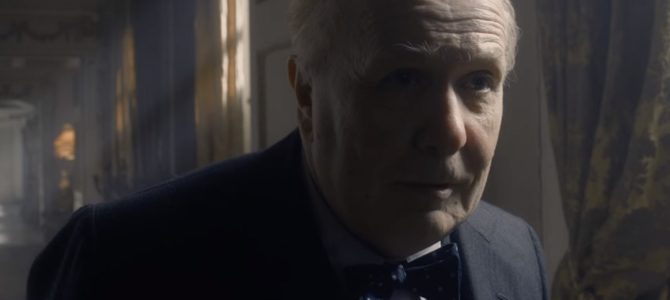
In an essay about Rudyard Kipling, George Orwell agreed with 1930s-era critics that Kipling was a jingo imperialist and reactionary. Yet, Orwell noted, Kipling has lasted as a literary figure, while other more “politically correct” writers had not.
This same longevity occurs with Winston Churchill, the subject of the film “The Darkest Hour,” which has nabbed nine Academy Award nominations. For the Left and even his fellow conservatives in the 1930s, Churchill was an unapologetic imperialist, much of which was true. He defended British control of India. At war’s end, Churchill cut an imperialist deal with Joseph Stalin: in exchange for no Russian interference against the British military forces in Greece, Churchill promised to look the other way at Soviet behavior in Eastern Europe.
Yet still he stands. The reason is Churchill’s uncompromising defiance of Adolf Hitler upon assuming the role of prime minister in 1940, the subject of the Oscar-nominated film starring an astonishing Gary Oldman. To understand just how courageous it was of Churchill to push back against Hitler, one should consider the conditions of 1940, particularly the one month covered in the film—from May to June 1940.
It Was Truly Britain’s Darkest Hour
By May 1940, all of Western Europe, save a “neutral” Spain, was under Hitler’s control. With France fallen, the Nazis were within invasion distance of England, and had begun their relentless “blitzkrieg” of England. England was truly alone in this fight. U.S. President Franklin Roosevelt was blocked from any military participation by the isolationist mood in Congress and the public at large. Meanwhile Stalin, who had previously demanded an anti-fascist security front against Hitler, was now a military partner of Nazi Germany, and was carving up Eastern Europe while the Luftwaffe was bombarding the British people night and day.
The atmosphere was indeed dire. Citizens’ militias were springing up (Orwell, a veteran of the Spanish Civil War, was among them) and were given shotguns for the anticipated house-to-house warfare when Germany invaded. But not everyone in the government was willing to use such desperate measures. Neville Chamberlain, that dogged appeaser, sought to broker a deal to spare England the coming slaughter by negotiating with Hitler via Italy’s Benito Mussolini, and King George VI backed this for a time.
Hitler’s blitzkrieg of the British did not move the populace to such ideas, however. When the bulk of the British army was pinned down on the benches of Dunkirk, ordinary citizens manned boats to get them off. And the British airmen who flew night and day to defend England from Hitler’s bombers truly were the “gallant few.”
Churchill Was Right There With His People
The irony of this situation was that Churchill, that bluff old imperialist who dismissed British labor strikes as “Bolshevik” and refused to even entertain the thought of an independent India, caught and represented the mood of the ordinary British citizen better than any politician at the time. The scene in the film encapsulating this “linkage,” in which Oldman rides in the tube with ordinary British citizens while the bombs drop overhead, probably did not happen. But it could have.
Churchill did appear on the street in numerous moments, and his defiance was applauded, particularly his “V for Victory” sign, which, his working-class secretary (an excellent Lily James) instructs in the film could be flipped around to represent the British version of the “middle finger” to Hitler.
Although he was silent about Mussolini destroying Ethiopia in 1935 and defended the Hitler-backed Francisco Franco in the Spanish Civil War (1936-1939), Churchill was nevertheless a “premature antifascist” who got Hitler’s number from the start. It was because of this that “socialist” Orwell paid him the ultimate compliment. When Orwell was longing for and predicting that the war would result in a “British workers’ state,” he stated that he would not be “surprised if Churchill would be leading it.”
Oldman plays Churchill as this prophetic anti-fascist. He does not shy away from the fact that Winston’s defiance was at least partly fueled by alcohol—in the film, Churchill has whiskey with his breakfast. Refreshingly, the women in his life are given their due, with Kristin Scott Thomas’ Clementine Churchill giving Winston a daily pep talk while adjusting his tie.
Churchill had other exceptional moments. In 1946, he alerted America of the “Iron Curtain” behavior by the Soviets in Eastern Europe. And he steadfastly refused to put British ground troops in Vietnam in the mid-1950s. But nothing could match his behavior as prime minister during World War II. His defiance was legendary, and “The Darkest Hour” perfectly catches this.









